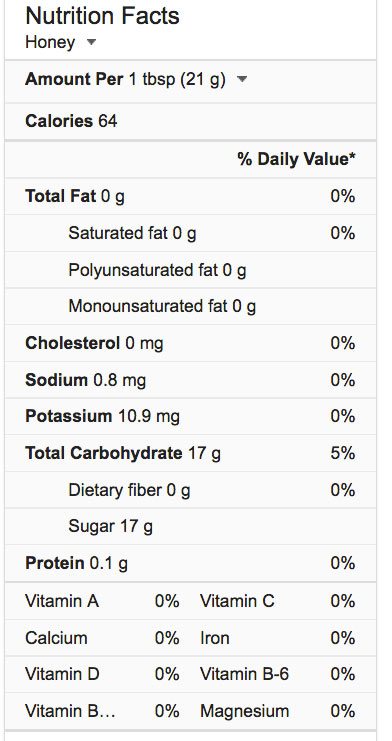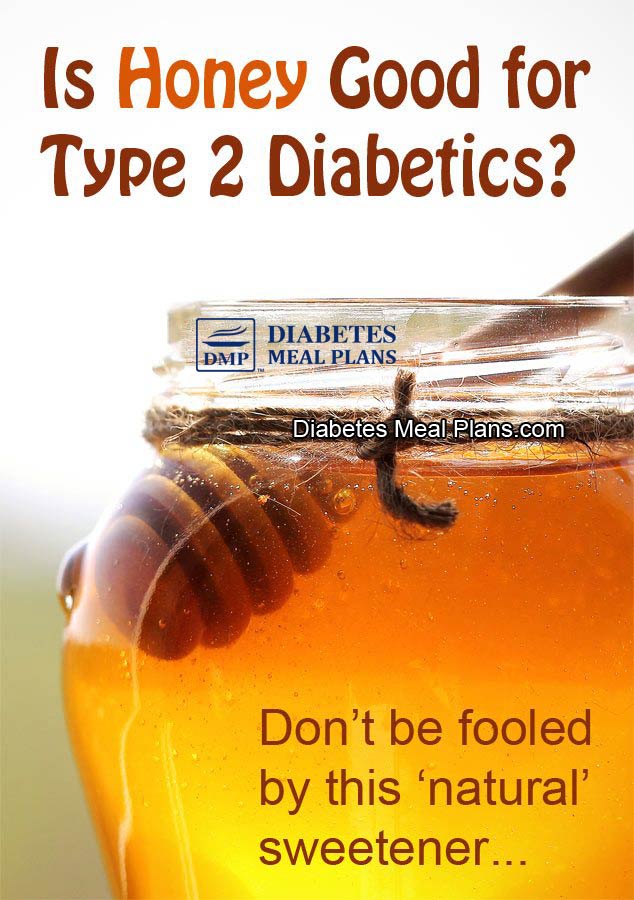Table of Contents[Hide][Show]
Honey has been used to sweeten foods and cure minor ailments for centuries. There are even 8,000 year old cave paintings that depict humans foraging for honey in the wild!
That’s because we all know that honey tastes good, right? Oh yes, that sweet syrup is divine.
But is honey any good if you have diabetes?
Let’s dive into the nutrition facts and find out.

Honey Nutrition Facts
Honey can be tasty and it does have some health benefits (for the general population), but for you as a diabetic, it has one fatal flaw: it is not a low carbohydrate food – no way near it!

One tablespoon of honey contains 17 grams of carbs and it’s all pure sugar – notice the carbs and sugar are exactly the same – both 17 grams. This goes for refined, raw or manuka honey – they are all the same. High in carbs.
If you’re sticking to a low carb diet to try to control blood sugar and A1C, then just a small serving of honey can see you exceed your carb limit, very quickly.
You’ll also notice that the label shows zero grams of dietary fiber. When we’re talking sugar and carbohydrates, it’s always better when a food also contains some fiber because the fiber slows down the rate at which the sugars enter your bloodstream.
When you eat a high carb food with no fiber, your blood sugar levels raise much quicker.
Overall, you really want to avoid blood sugar spikes like this, so unfortunately, honey is not the ideal sweetener for diabetics.
Honey compared to other sweeteners
The common assumption is that honey is better for you than regular white sugar because it’s a ‘natural’ sweetener.
But in truth, how does honey compare to other sweeteners?
When you look at the number of carbs in each of the following sweeteners, you might be surprised to find that honey actually contains more carbs per serving (1 tablespoon) that white sugar does!
White sugar: 12.6 grams of carbs, 48 calories, glycemic index of 68
Brown sugar: 13.5 grams of carbs, 51 calories, glycemic index of 64
Honey: 17 grams of carbs, 64 calories, glycemic index of 60
Maple Syrup: 14 grams of carbs, 52 calories, glycemic index of 54
All of these options are pretty high in carbs — so really, they are all the same — not good for you as a diabetic!
Myths and Truths
Myth: Honey is a natural product that’s been around for thousands of years, and it’s allowed in some lower carb diets like the paleo diet, along with being supported by many health gurus, so it must be the healthiest choice of sweetener.
Truth: While honey may be slightly preferable to white sugar (in terms of some health benefits), it still isn’t the picture-perfect sweetener for diabetics. It is high in carbs and contains a lot of fructose, both of which aren’t compatible with a diabetic diet.

Research on honey and type 2 diabetes
At a grocery store you may come across different kinds of honey. Most honey has been processed and pasteurized, unless it is specifically labeled as “raw and organic.” Highly processed honey does not carry the same health benefits as raw honey (because all the goodness has been removed), but it tastes just as sweet.
The good: Raw honey has several potential health benefits (for the general population). For instance, unprocessed honey contains anti-bacterial properties similar to those found in antibiotics, and it’s often added to herbal tea as a home remedy to soothe sore throats and cure the common cold.
In terms of honey, manuka honey is well-known for offering the most nutrients and medicinal benefits. But overall it’s still high in carbs like all other types of honey.
Also, in animal studies, when comparing raw honey with white sugar, honey is associated with mild weight loss and lower levels of triglycerides (fats in the blood), which researchers suggest could crossover to humans if they replace the white sugars in their diet with raw honey — though there is no actual proof for this, so I wouldn’t go thinking this is likely to happen, as generally, intake of sugar (and honey is sugar) leads to increased fat storage.
The bad: About half of the sugars found in honey come from fructose and diets high in fructose have been shown to cause a range of metabolic problems — liver disease, general inflammation, sugar cravings, weight gain, insulin resistance, and the list goes on.
The ugly: Honey is a high carb food. This means that eating a tablespoon of honey will cause blood sugar levels to rise (perhaps more than you want them to).
There’s a reason why we encourage a low carbohydrate diet – because it works to get the best outcomes – lower blood sugar, A1C, cholesterol and even increased weight loss. So unfortunately, honey just doesn’t fit in that picture.
Conclusion
The ideal diabetic diet is much lower in carbs than most Western diets currently are. And despite some people saying you can eat everything in moderation, this simply isn’t true if you want to get the best results.
It’s important to be aware of the difference between diabetes PREVENTION and diabetes TREATMENT. Many foods are considered “healthy” for the general population and may very well reduce risk of getting diabetes.
But, once you have a health condition (diagnosis of type 2 diabetes or prediabetes), you have to change tunes and switch to eating to TREAT your condition.
This means recognizing high carb foods and switching to lower carb alternatives that can help you control and maintain glucose and A1C control.
Honey is basically the same as eating sugar – despite the fact that it is more ‘natural,’ it is still pure sugar.
So for best results, we generally recommend you kick high carb sweeteners (like honey) to the curb and stick to an alternative sweetener such as stevia, which has no carbs or calories and no effect on blood glucose either.
Please pin, tweet or share this info to help other diabetics like you. Thanks!

Marty
Thanks for this I was under the impression that a little honey in my smoothies wouldn’t hurt, I can see it will contribute to spikes
Ricky
Being part of this forum has been one of the nicest and prudent steps ever taken
Lydia Douglas
Yep. Can’t use honey at all. Spikes like way up there. I get annoyed with these diabetic meal plans. Anyway I am more plant based. and loving it. However my hubby is the meat guy works for him. Thank goodness loves his veggies. Back to the meal plans when I put the ingredients in the counter not so good for me. Good report for a change. Thanks
Joyce Brant
Always thought honey to be the health food. I am sad to read it is not.
Jedha
There are lots of misconceptions about food. Although honey is natural it is still sugar.